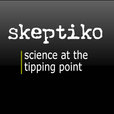209. Talat Jonathan Phillips Chronicles His Transformation From Political Activist to Spiritual Seeker

Summary: Interview with activist and author explores his personal journey with Ayawaska, ETs, and energy healing. Join Skeptiko host Alex Tsakiris for an interview with Talat Jonathan Phillips author of, The Electric Jesus: The Healing Journey of a Contemporary Gnostic. During the interview Phillips talks about finding a balance between the worldly and spiritual pursuits: Alex Tsakiris: If you buy into materialism, if you think you’re a biological robot and that’s all you are -- you’re lost. If you buy into our materialistic culture and this idea that we need to get all we can, and we need to bomb other people so they don’t get it -- all that stuff -- you’re lost. But as soon as you cross that chasm and you say, “Okay, there’s something more”, then I think you run into this problem what we’re talking about. And that is materialism keeps wanting to creep itself back into the equation. So, you’re saying, “I need to take action here. I need to go do this. I need to vote for this candidate. I need to do that.” Isn’t there the risk that we get into this back-door materialism, this “we’re in control” thing? Talat Phillips: Oh yeah. But I think it’s both. We’ve set up an either/or and I think it’s both/and because if I look at most of my clients, most of them come in and think we’re going to talk about past lives and this and that. But most of them need to get into the material world a little bit. They need to get in their bodies and figure out jobs and live an abundant life. That doesn’t mean buy a mansion but it just means to know how to support themselves and talk with people. I don’t want to deny that aspect because it is important. I denied it for many years of my existence and maybe that was why I was a marginalized activist. On the other hand, I definitely saw this with Occupy. It was very frustrating for me seeing all the projected anger about finances. I do a lot of anger work with clients. It’s good to express anger but when you project it at others it creates more of that fear culture. What I like with Evolver.net is that we’re more like, “How can you create? How can you follow your bliss and your passions and do what you love?” I think Joseph Campbell talks about this. This is a dance we have of integrating. So I think what you’ve brought up is a great study that we all do. It’s an alchemy of walking as a human and being as a human on this planet. It’s being and doing and creating a right relationship between that. Talat Jonathan Phillips Website Play It Listen Now: Download MP3 (47 min.) Read It: Today we welcome Talat Jonathan Phillips to Skeptiko. Talat is the author of The Electric Jesus: The Healing Journey of a Contemporary Gnostic. He is also the co-founder of a rather amazing web magazine named Reality Sandwich and an equally amazing social movement at www.evolver.net. Welcome to Skeptiko, Talat. Thanks so much for joining me. Talat Phillips: It’s great to be here. Thanks, Alex. Alex Tsakiris: Well, your book, The Electric Jesus, is just a great read. I mean, I was just blown away at how it pulls you in and just makes you want to turn page after page. It’s a spiritual odyssey, as the name suggests, but it reads like a Tom Wolfe novel. Tell us a little bit about this book and how it came about and what people are going to find when they read it. Talat Phillips: I think I might cite you on that, Alex, that it reads like a Tom Wolfe novel there. I think first I want to say how I feel like it’s a unique book in the sense I feel there are very few books out there like this, that are spiritual and counterculture and a memoir. I grew up reading On the Road and Electric Kool-Aid Acid Test, which the title is a little bit of a reference to, as well. In small town Colorado I was like, ‘Where’s the bus here?’ Wherever that bus is I want to be on it. I feel like the book talks a little bit about how I feel the buses are arriving for a lot of people in the festival culture,
